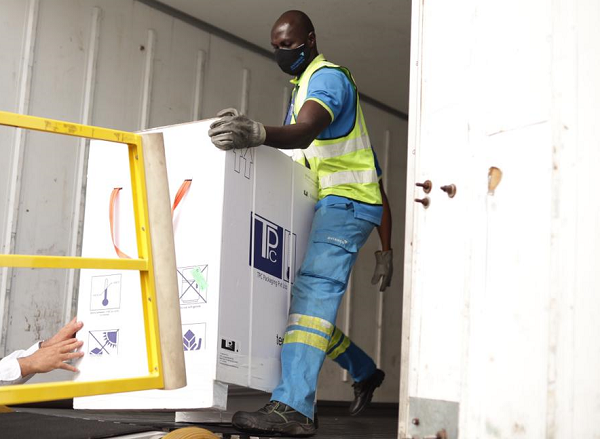Ghana is set to begin COVID-19 vaccination from next Tuesday as part of measures to stop the further spread of the viral disease.
This follows the arrival of the first consignment of 600,000 doses of the Oxford AstraZeneca COVID-19 vaccine, Covishield, in Accra yesterday.
The vaccine arrived at exactly 7:45 a.m. aboard Emirates Airlines flight EK787, shifting global attention onto the country for chalking up another first.
Ghana became the first country to receive the COVID-19 vaccine from the COVID-19 Vaccine Global Access Facility (COVAX), which has 92 beneficiary countries signed on to it, the World Health Organisation (WHO) said.
Global attention
The Minister designate for Health, Mr Kwaku Agyemang-Manu, led a delegation to receive the vaccines on behalf of the government.
A joint statement by the UNICEF Representative in Ghana, Ms Anne-Claire Dufay, and the WHO Representative, Dr Francis Kasolo, on the arrival of the first COVID-19 vaccine in Accra said: “After a year of disruptions due to the COVID-19 pandemic, with more than 80,700 Ghanaians getting infected with the virus and over 580 lost lives, the path to recovery for the people of Ghana can finally begin.
“This is a momentous occasion, as the arrival of the COVID-19 vaccine into Ghana is critical in bringing the pandemic to an end. The only way out of this crisis is to ensure that vaccination is available for all.”
The statement said the vaccine was part of an initial tranche of deliveries of the AstraZeneca/Oxford vaccine licensed to the Serum Institute of India, which represented part of the first wave of COVID-19 vaccines headed for several low and middle-income countries.
“We are pleased that Ghana has become the first country to receive the COVID-19 vaccine from the COVAX facility. We congratulate the Government of Ghana, especially the ministries of Health and Information and the Ghana Health Service, on its relentless efforts to protect the population,” it said.
COVAX initiative
Championed by the Global Alliance for Vaccine and Immunisation (GAVI), the WHO and other international organisations, the COVAX is offering beneficiary countries vaccines for least 20 per cent of their populations for free.
Ghana’s vaccination programme is guided by the National Vaccine Deployment Plan (NVDP) for COVID-19, which targets an initial 20 million out of the 31 million estimated population, to reach a herd immunity of 60 per cent.
An estimated GH¢294.5 million (approximately $51.7 million) will be spent to vaccinate the initial 20 million people in phase one of the three-phase programme.
Expedited exercise
The Director-General of the Ghana Health Service (GHS), Dr Patrick Kuma-Aboagye, said the 600,000 doses were acquired at no cost to the state because it formed part of the COVAX offer.
He said the first two phases would travel two rounds each in two months, each round lasting at least 14 days.
He said vaccination for the first target groups would employ the static strategy, where the vaccination was done through existing health facilities for a more organised exercise.
Statement
In a statement, the Minister designate for Information, Mr Kojo Oppong Nkrumah, reiterated that the vaccination would be in segments.
“The first segment of the population that will receive from the 600,000 doses will be health workers, adults 60 years and over, people with underlying health conditions, frontline health workers, the Executive, the Legislature, the Judiciary and their related staff, frontline security personnel, some religious leaders, essential workers, teachers and other personalities in the Greater Accra Metro, including Awutu Senya and Awutu Senya East in the Central Region.”
He said a similar segmented population in the Greater Kumasi Metro and the Obuasi municipality would also be covered.
“From 2nd March, the COVID-19 vaccine will be deployed in health facilities and designated centres in these geographical regions. The government of Ghana remains resolute at ensuring the welfare of all Ghanaians and is making frantic efforts to acquire adequate vaccines to cover the entire population through bilateral and multilateral agencies,” the President’s representative at the Information Ministry said.
He urged the public to do their bit by ensuring that they got vaccinated when they were due.
Mr Oppong Nkrumah acknowledged the hard work of the technical teams from the GHS, the Ministry of Health, the Ministry of Information, the COVID-19 Task Force and all those who had assisted in getting the country that far.
“Our development partners are also acknowledged for their tremendous financial and technical support. It is our hope that they will continue to support us in our sustained effort in combating this virus and putting COVID-19 behind us,” the statement said.
Background
In his 20th address to the nation on COVID-19, President Akufo-Addo gave an assurance that the government would ensure that the COVID-19 vaccine to be deployed in the country was effective and safe.
He said the country was expected to receive its first consignment of the vaccine in March 2021.
The President, however, charged the task force to work towards cutting short the process and make the vaccination exercise begin two weeks ahead of the April 14, 2021 initial date of commencement.
The World Bank has estimated that Ghana will need a minimum of $180 million to procure vaccines that can cover 60 per cent of its population.
Writer’s email doreen.andoh@graphic.com.gh

